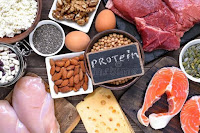Protein
What is protein?
Proteins are made up of amino acids, which act as the "building blocks" of cells. Proteins play many important roles in the body such as: Proteins do most of the work in cells and are essential for the structure, function and regulation of body tissues and organs. Protein is found in many foods such as meat, fish, poultry, eggs, eggs, and dairy products.
Picture: Photos of different protein enriched food and vegetablesTable of Contents
Importance of consumption of protein.
Protein is necessary for good health. Proteins do most of their work in the cell and perform a variety of functions. Proteins are made up of amino acids that are joined together to form long chains. There are 20 amino acids that help build thousands of different proteins in your body. Manufactured proteins make up many tissues in our body, including muscles and organs, as well as hormones and the immune system.
Sources of protein.
Fish, meat and poultry are some of the main sources of protein. One egg contains about 6 grams of protein. Dairy products are also important sources of protein. Protein is found in both plant and animal based foods. Beans are a good source of vegetable protein. They are essential for vegetarians but an important part of all balanced diets. Many nuts and seeds contain protein. They are a good source of many vitamins and minerals required by our body.
Function of protein in body formation and disease control.
- Protein builds and maintains your body.
- Foods containing protein provide energy to your body.
- Assists thousands of biochemical reactions that occur inside and outside your cells.
- Some proteins are hormones, which are chemical messengers that help communicate between your cells, tissues, and organs.
- Proteins play an important role in regulating the concentration of acids and alkalis in your blood and other bodily fluids.
- Proteins regulate the body's processes to maintain fluid balance.
- Proteins help produce antibodies to fight infection.



Comments
Post a Comment